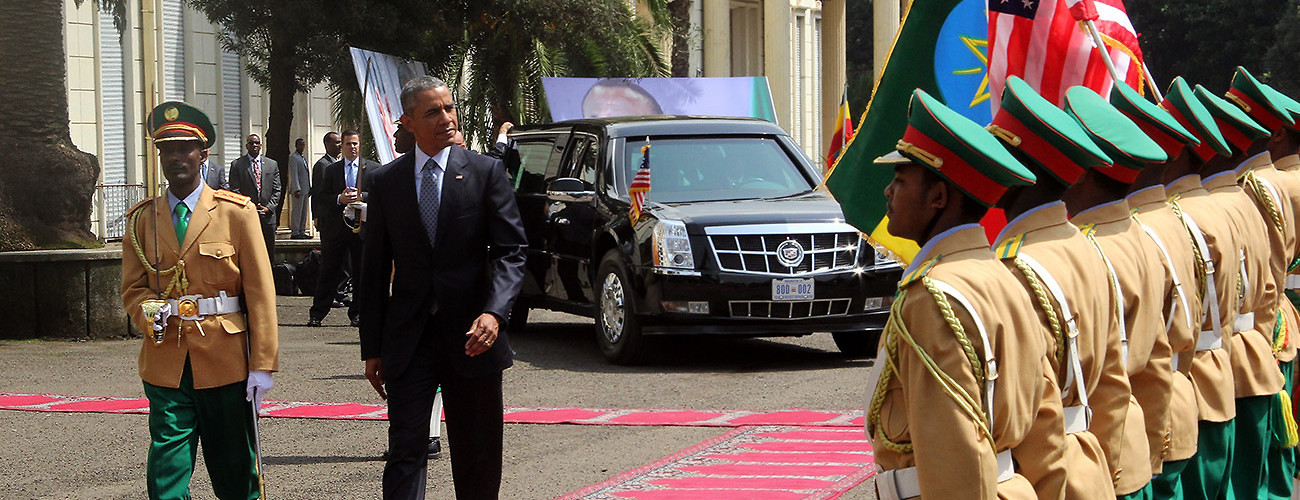US President Barack Obama passes a guard of honor before a meeting with Ethiopian Prime Minister Hailemariam Desalegn. Addis Ababa, Ethiopia, July 27, 2015. (Minasse Wondimu Hailu/Anadolu Agency/Getty Images)
United States President Barack Obama’s late July visit to Africa marked the high point of his efforts to strengthen and solidify US policy on the continent. Obama hosted newly elected Nigerian President Mohammadu Buhari in Washington, DC, prior to his departure, then met the leaders of Kenya and Ethiopia, as well as officials from the African Union (AU). These events were preceded by Obama’s earlier visits to Ghana and Egypt in 2009 and to Tanzania, Senegal, and South Africa in 2013, which included delivering his memorable eulogy to the latter’s Nelson Mandela at the end of the year. Coming from a leader and administration heavily preoccupied with multiple crises in the Middle East and Eastern Europe, as well as promotion of the Trans-Pacific Partnership trade deal, these visits represent the high water mark of Obama’s African policy engagement.
The focus of these visits, as well as the US-Africa Leadership Summit in Washington, DC, in August 2013, has been uniformly upbeat, emphasizing the importance of investment in African infrastructure, trade, and development linked to the promotion of democratic institutions and protection of human rights on the continent. Obama has put forth new programs on increasing electrical power transmission and strengthening food security, whose benefits are yet to be widely felt. While calling out those African leaders who have made themselves “presidents for life”—none of whom he has met—and urging them to retire forthwith, he carefully downplayed the lapses from democratic principle and practice of his Kenyan and Ethiopian hosts, the former still under an International Criminal Court cloud, and the latter winners of a 100% parliamentary election outcome.
Security concerns in Somalia and Kenya in East Africa and in Nigeria, Mali, and the Sahel region continue to predominate US political engagement in Africa. The US, together with the European Union, continues to provide the essential financial and logistical support for the AU mission in Somalia eight years after its establishment, as well as the more recent, and related Kenyan military operations on the Kenya/Somalia border. President Buhari was, however, upset by the Obama administration’s invocation of the Leahy Law (prohibiting military aid to armies who have violated human rights principles) to turn down his request for assistance in the fight against Boko Haram. It remains to be seen whether Buhari will appoint a commission to investigate the charges against Nigeria’s human rights record—a step which could lead to a restart of bilateral military assistance.
The unspoken presence during Obama’s visits has been the highly visible and financially important role of China on the African continent. In addition to loans and projects undertaken by the Chinese government, private Chinese investors, developers, and business entrepreneurs are active all over the continent. At a tangible and visible level China’s official investments and agreements have overshadowed US and European engagements, the latter often rendered conditional on human rights and democratic practices, unlike those coming from Beijing. Obama’s speech to the African Union took place in the newly opened parliamentary chamber recently financed and built by China—a reality whose significance everyone in the chamber understood.
So is US engagement on Africa substantive or only symbolic? The answer to this question, recently posed by the Director of the Center for Conflict Resolution Adekeye Adebajo, is ultimately up to the Africans to answer. The US can encourage and support democratic change, but only African leaders and civil society can make it happen. On economic growth China is potentially playing a transformative role that will surpass American contributions to the continent, but much depends on whether the benefits will reach the majority of the population. This will only happen if there are improved educational and training opportunities for the next generation of young people in this new age of digital communication and participation in the global economy.





